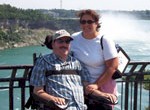The Nightmare Continues…
I was still pretty out of it when they were preparing me for the trip to Thomas Jefferson University Hospital. It seems my oldest brother, Angelo, was working pretty hard to do what he could to get me transferred there. At the time, New Jersey hospitals didn’t have the best reputation, so he wanted me to get out of there and into Jefferson as soon as possible. I don’t remember being brought to the helicopter, or even being loaded in. All I remember is finding myself being in mid-flight, airlifted, to my new destination.
It was a first for me; riding in a helicopter. Something I’ve always wanted to do. But at that moment, I would’ve given anything to be somewhere else. It was probably one of the worst trips I’ve ever taken. I distinctly remember the vibration of the brace screwed into my head. A constant, subtle shaking caused by the helicopter blades as they chopped through the air somewhere between Ocean City, New Jersey and Philadelphia, Pennsylvania. I remember wanting to tell the paramedic who was accompanying me, but the combination of the tubes running down my throat and my own fatigue, prevented my discomfort from being heard. I just wanted it to stop, and if it wouldn’t mean the death of the helicopter crew, I just wanted the helicopter to come crashing back down to Earth and end the nightmare I was living. In retrospect, I probably was more comfortable during the 20 minute flight than I would have been during a 2 hour ambulance ride on the Atlantic City Express Way, but at the time, I just wanted it to end.
Finally, the helicopter came to rest on the rooftop heliport of Thomas Jefferson Hospital. The paramedics slowly and carefully eased me out onto a waiting stretcher surrounded by hospital staff. I remember feeling the warmth of the sun on my face as they rushed me from the heliport into the hospital. I just wanted that warmth to last forever, and I wanted to open my eyes to find myself still lying on the sand of Ocean City. However, as we entered the hospital, and my opened eyes readjusted to the light, I was face to face with a doctor. She told me where I was, what had happened, and what would happen to me. I actually felt better. She made me feel that everything was going to be OK; that I was going to be OK. For the first time I had an actual sense of hope. Unfortunately, that feeling was incredibly short-lived.
I was brought to my room in the Intensive Care Unit (ICU) and hooked up to various machines including a respirator. I met various nurses and doctors who were going to be taking care of me. I was still very confused, and don’t remember much of what was going on around me. Time just seemed to be swirling around me; there was no continuity anymore. I kept slipping in and out of consciousness, each time compounding my confusion. It would be a few days until I started to regain some sense of day and night, and would be able to make sense of what was going on around me.
As I started to become more coherent, I remember realizing where I was and what had happened to me. The hospital staff were now more than fuzzy, faceless forms, and I started to get to know them. Friends and family came to visit. There wasn’t a day that went by where I didn’t have at least one visitor. At that time, however, I was not always in the mood to see them. I was scared, angry, and still wasn’t sure what was going to happen to me. I couldn’t even talk to anyone because of the respirator. I had to mouth my words, and hope that people would understand me. It was very frustrating. Doctors and residents were in and out of my room, checking me, taking blood, and keeping track of my progress. Then, one day, I got a visit from a doctor that changed everything:
He came in with a few other staff and started to explain everything to me. He told me exactly what had happened, explained my injury, and gave me my prognosis. He went on to explain that there was a chance that I would regain movement in my arms. This seemed like good news, but I knew there was more. I looked him in the eyes and mouthed the words, ”What about my legs?” He answered directly; it was more than likely that I would never use my legs again. Everything just stopped, and I started crying. “How did this happen to me?” “What did I do to deserve this?” “This can’t be happening!” These thoughts raced through my mind. I barely heard the doctor as he went on to explain what was next. They planned on operating to stabilize my spinal column by taking a bone graft from my hip to fix the damage to my vertebrae. They would also fit me with a “Halo Brace” to hold my head still while the bone healed. This brace would be bolted directly into my skull at four points, then stabilized to my shoulders. At that point, I didn’t care what happened to me—all I knew was that none of it would make me walk again. None of it seemed to matter…



